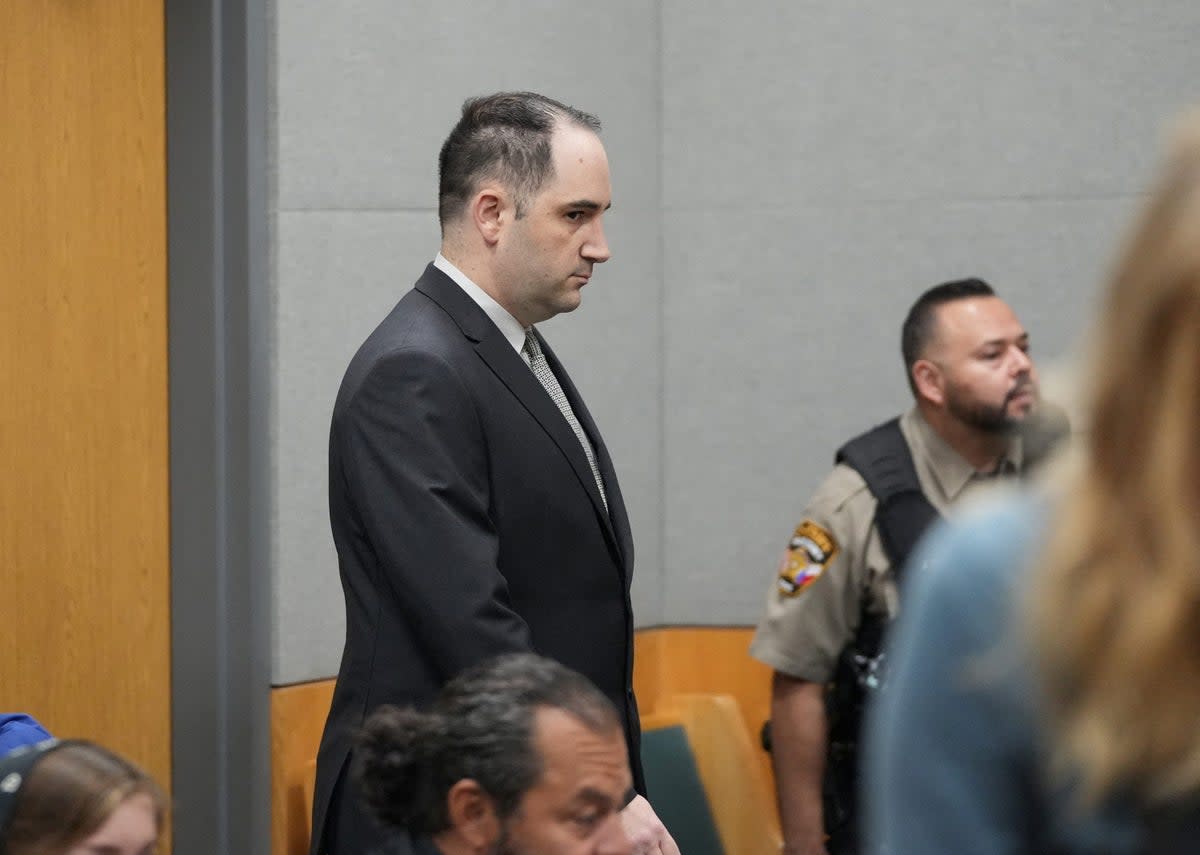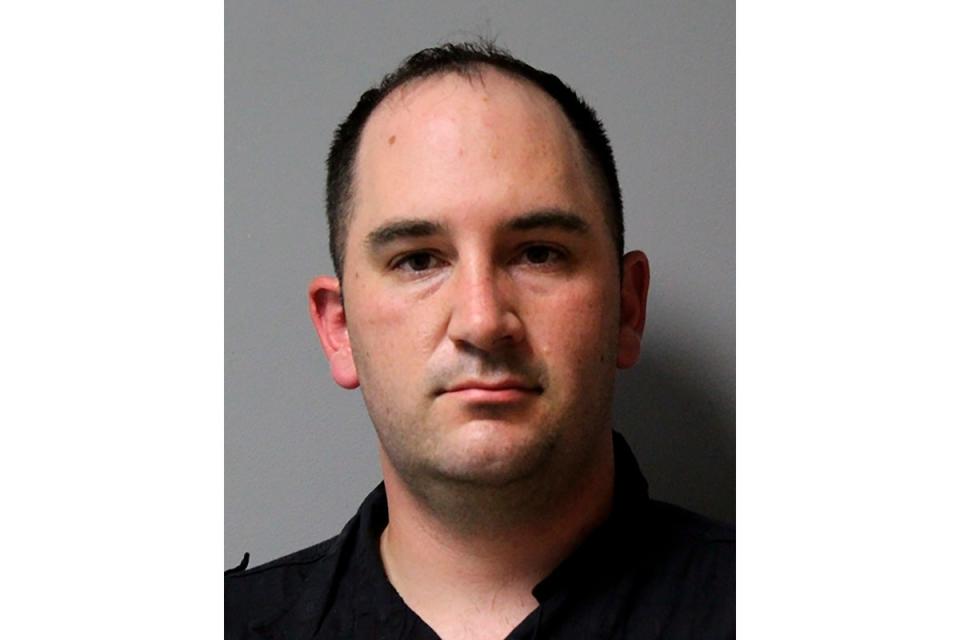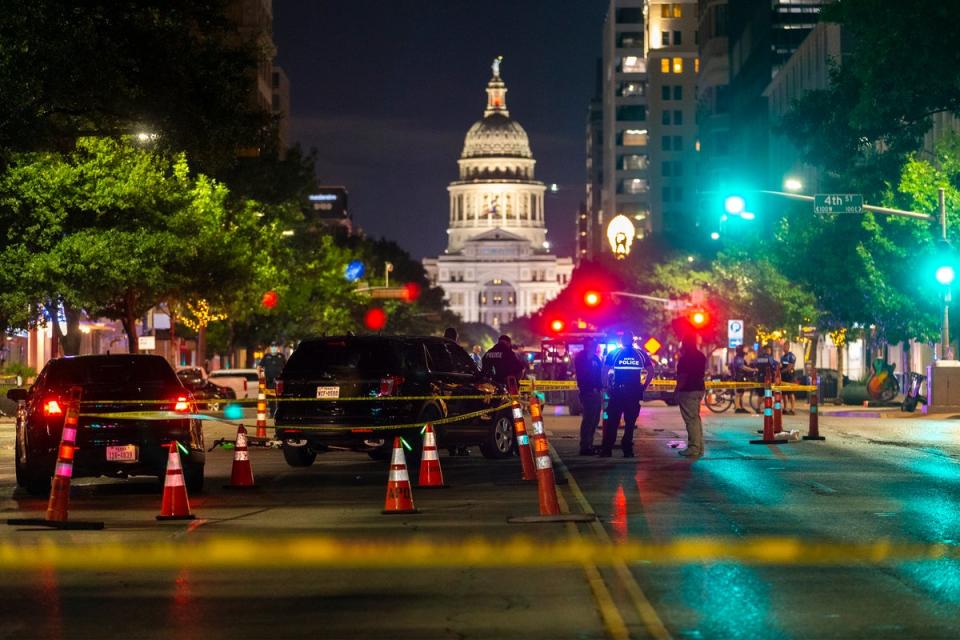An Army sergeant shot and killed a BLM protester. Texas Governor Gregg Abbott wants to pardon him

- Oops!Something went wrong.Please try again later.
When does self-defence end and aggression begin? Does the right to bear arms apply to everyone, or just certain kinds of people in certain kinds of situations? Is a liberal protester’s life as much as a conservative Army veteran’s? Who controls the local justice system?
These are some of the questions being raised by the case of Daniel Perry, a US Army sergeant who was found guilty on Friday of murdering Black Lives Matter demonstrator Garrett Foster, who was also armed, during 2020 racial justice protests in Austin.
Normally, a jury verdict, like the unanimous one in Austin on Friday, would be the end of things, but conservatives are pressuring Texas governor Greg Abbott, a Republican, to give Perry, 37, an unprecedented criminal pardon.
By all indications, Mr Abbott is ready to offer him one.
The governor wrote in a statement on Saturday he would sign off on a pardon, which first needs to be recommended by a state board, “as soon as it hits my desk,” praising Texas for having “one of the strongest ‘Stand Your Ground’ laws of self-defence that cannot be nullified by a jury or a progressive District Attorney.”
The proposal has been harshly criticised by some.
Austin-based state senator Sarah Eckhardt told the Texas Tribune a pardon would be “a stunning and dangerous abrogation of the rule of law that will embolden more armed confrontations and inevitable tragedies.”
Travis County district attorney José Garza, whose office prosecuted Perry, called the pardon promise “deeply troubling.”
“In our legal system, a jury that gets to decide whether a defendant is guilty or innocent – not the Governor,” Mr Garza said in a statement.
‘I might have to kill a few people on my way to work’
On 25 July, 2020, Perry was working as an Uber driver in Austin, during a summer filled with numerous racial justice protests across US cities following the murder of George Floyd, a Black man in Minneapolis smothered to death by police officers who knelt on his neck.

The month prior, Perry wrote on social media, “I might have to kill a few people on my way to work, they are rioting outside my apartment complex.”
“Can you legally do so?” a friend responded, according to evidence presented in court.
“If they attack me or try to pull me out of my car then yes,” the Army sergeant said.
On the night of 25 July, Perry, who admitted he had been texting and driving distractedly, ran a red light and drove into the thick of a crowd of Black Lives Matter demonstrators, nearly hitting Whitney Mitchell, a quadruple amputee.
Among the crowd was Mitchell’s husband, 28-year-old Garrett Foster, an Air Force veteran, who was openly and legally carrying an AK-47 rifle.
Witnesses say Foster, who was white, gestured with his gun for the Uber driver to “move on.”
According to video shown to the jury, Perry told police in a later interview, "I believe he was going to aim at me. I didn’t want to give him a chance to aim at me.”
Shaky video of the moment, captured by journalist Hiram Gilberto, shows the car in a crowd of people. Honking can heard. Someone nearby says, “Everybody back up,” then shots from Perry’s .357 revolver ring out, as protesters scream and scatter.
Foster was killed.
Perry fled the scene, then reported the incident to police, saying he shot in self-defence after a weapon was pointed at him, according to the Texas Tribune.
‘We will show them why we say don’t mess with Texas’
Perry’s trial lasted two weeks, and jurors deliberated for 17 hours before reaching their verdict. The man could face up to life in prison at his sentencing, which might happen as soon as next week.
At trial, Perry, who is also white, claimed he was acting in self-defence.
The Army sergeant didn’t testify during the trial, but his attorneys vowed to keep fighting his case.
“He is devastated,” his lawyer, Doug O’Connell, said in a statement after the conviction. “He spoke to me about his fears that he will never get to hug his Mother again. He’s also crushed that this conviction will end his Army service; he loves being a Soldier.”
Prosecutors, meanwhile, argued Perry was out looking for confrontation. In addition to the June messages raised at trial, local reporting has uncovered other statements that seem to capture the sergeant talking about aggression.
In June 2020, then-president Donald Trump tweeted that “protesters, anarchists, agitators, looters or lowlifes” in Oklahoma wouldn’t get the same kind of sympathy they’d find in more liberal states, and Perry responded with a tweet that read “send them to Texas we will show them why we say don’t mess with Texas.”
But the decision by the jury wasn’t the end of the case.

Conservative figures quickly latched onto Perry’s story, lobbying for Governor Abbott to pardon him.
Kyle Rittenhouse, who became a right-wing influencer after shooting three people during a confrontation at a 2020 racial justice protest in Wisconsin, claimed Perry did “nothing wrong.”
“We must hold these one sided prosecutors accountable,” Mr Rittenhouse said, linking to an affidavit from a detective who claimed the case suffered from witness tampering.
(A judge dismissed those claims in 2021.)
On Fox News, Tucker Carlson railed against Travis County District Attorney José Garza, who has received money from a George Soros-backed PAC, calling the conviction a “legal atrocity.”
“Because in Austin, Texas, the justice system is overseen by a Soros funded DA, Perry was charged with murder for defending himself,” the host said. “It means that in the state of Texas, if you have the wrong politics, you’re not allowed to defend yourself. “
‘This was clearly premeditated’
Others argued the exact opposite of Carlson, that Garrett Foster was legally exercising his right to defend himself, and that Perry may be able to escape punishment for violating it.
“This was clearly premeditated,” his brother Ryan told the Austin Statesman. “He (Perry) thought a lot about it and planned on doing it. ... He wanted to kill a protester and saw somebody exercising their Second Amendment right.”
Critics said a pardon could set the wrong example.
“Not only is this a not particularly sympathetic defendant, but the pardon sends a terrible message,” Atlanta-based attorney Andrew Flesichman wrote in an opinion piece in the The Daily Beast. “Provoking a fight to kill someone is ok, the pardon will, say, if the right kind of person is killed.”
‘Soros prosecutors are evil’
The debate over Perry’s case is part of a larger push in Texas to limit the power of locally-elected prosecutors.
As part of Governor Abbott’s message about the pardon, he made sure to mention his intention of “reining in rogue District Attorneys, and the Texas Legislature is working on laws to achieve that goal.”
On Wednesday, a bill passed the state senate, which would limit the ability of prosecutors to exercise discretion and avoid pursuing certain cases. Some local officials in liberal cities have indicated a willingness to avoid prosecuting violations of Texas’s near-total abortion ban or often dubious allegations of election fraud.
It’s part of a larger narrative on the right criticising liberals for having political donors attempt to influence the justice system.
Conservative activist Mike Davis, for example, referred in a recent tweet to prosecutors elected with PAC money tied to George Soros as “evil, subversive, dangerous Marxists” who are “cancerous tumors in states.”
Of course, mingling money and judicial power is a feature across the political spectrum beyond Soros, including the Federalist Society’s deep influence in remaking the federal judiciary and Supreme Court into a bastion of hard-right conservatism, or recent allegations that billionaire and GOP Harlan Crow lavished Supreme Court Justice Clarence Thomas with luxury vacations.
Perry, if the Texas parole board recommends a pardon, could walk free in a matter of days, but the debate around guns, self-defence, and what justice means when these things collide, isn’t going anywhere.

